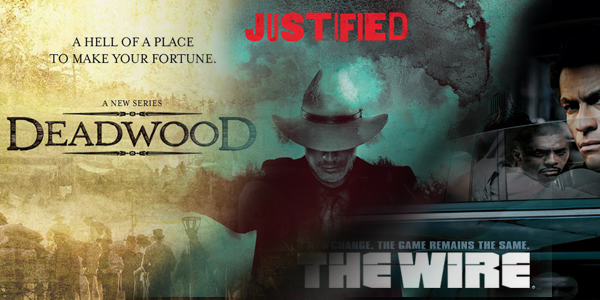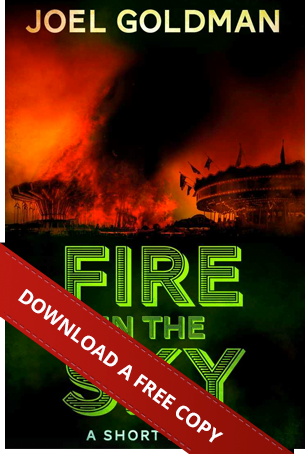
A guest post by Kate Naylor
As a copywriter I love great dialogue, whether it’s a crime novel or a TV series. The Wire and Deadwood – both created by HBO – are my kings of the hill, along with Graham Yost and Elmore Leonards’ Justified.
Run-of-the-mill crime stories major on plot and imagery, with less thought for the script. But classy American true crime stories like Deadwood and fictional crime stories like Justified and The Wire use language much more creatively.
Yes, the dialogue in Law and Order and CSI does what it says on the tin. It communicates clearly and succinctly. But the language is utilitarian, with humour thin on the ground. It’s all very efficient, all very effective, but devoid of soul and personality, a relatively arid landscape where actions really do speak louder than words.
Crime stories with a big difference
How come series’ like The Wire are so special? Perhaps it’s because each CSI episode covers a story from start to finish, while The Wire, Justified and Deadwood weave their plot magic over several series, meandering along in a much more leisurely and lifelike way. Unlike an ordinary, mainstream crime story, the characters are just as important as the plot and they’re allowed to develop accordingly. Because they’re unique, complex, multi-dimensional, they’re more real, human, better rounded. And ‘better rounded’ means they each have their own way of expressing themselves.
Flawed to perfection – The true crime story done properly
What do my favourite American crime stories owe their success to? It’s partly because the characters are so fabulously flawed. In CSI the stars of the show are allowed to slip now and again, revealing less than perfect attitudes and bad decisions. But once the episode is over they tend to return, unscathed, to their squeaky clean comfort zone where black is black, white is white and there’s very little grey. Whereas in reality people are inconsistent, swayed by experience, greed and grief, aware we’re doing wrong but unable to stop ourselves, knowing we’re being idiots but trapped by circumstances, our pasts, fears, dysfunctions, desires, love, hate or indifference.
The Wire – A masterpiece in the art of great dialogue

If you’ve seen series two of The Wire you’ll know what I mean when I say the ‘fuck’ scene is one of the finest pieces of TV scriptwriting I’ve ever seen. I haven’t timed it, but it lasts around five mind-blowing minutes, in which the f-word is the only word used.
When Jimmy McNulty, played to perfection by British actor Dominic West, and his detective colleague Bunk Moreland, played by the brilliant Wendell Pierce, visit a murder scene, they go into professional mode. They know their jobs, and one another, so well that they swing into action automatically, examining the evidence without needing to talk… except for judicious and beautifully creative use of the word ‘fuck’, which the actors use to hilarious effect. It’s extremely clever. And it illustrates their crime solving expertise more clearly than any amount of ordinary dialogue could.
I loved the series before discovering the famous ‘fuck’ scene. But afterwards I was completely sold – it jumped straight to the top of my TV viewing chart, shunting my previous chart-toppers Breaking Bad and Carnivale off the top spots.
The Wire quotes
The Wire is absolutely crammed with wonderful word play and top class banter. Here’s one of my favourite exchanges, which set me laughing so hard I almost did myself a mischief.
For you I would suggest some pantsuits, perhaps muted in color, something to offset Detective Moreland’s pinstripe lawyerly affectations and the brash tweedy impertinence of Detective Freamon. Rawls is watching on this one, let’s at least pretend like we got a fucking clue.”
Gorgeous. Better than chocolate. And almost as good as sex. I don’t know about you, but I’m in dialogue heaven. Anyone who can do ‘wry’ so perfectly gets my vote. These days David Simon and Chris Collins, The Wire scriptwriters, rank high amongst my literary heroes. Gents, I salute you.
If you haven’t seen The Wire yet, the boxed set will have you glued to your telly from start to finish. And if you want to check out the ‘fuck’ scene, here it is on YouTube.
Deadwood – A genuine American true crime story
The small town of Deadwood has a remarkable history, the real thing, a true tale of cowboys, lawmen and indians woven to perfection in Deadwood, the series.

Deadwood’s evil ‘limey’ pimp and gangster character Ellis Albert (‘Al’) Swearengen’s language is richly funny. He’s a revolting, violent, cruel, angry man with the morals of an alley cat and about as much human empathy as a lump of quartz. Yet the writers manage to make him attractive through stunningly clever dialogue. Much as you love to hate him, he’s inconsistent and human enough to do the right thing now and again. Just when you thought he was the devil incarnate, the bugger behaves completely out of character and changes your mind – you’re disarmed, whether you like it or not.
I love the way he uses swearing as punctuation, to express every emotion from good, through bad, to indifferent. He must be one of the most foul-mouthed folk on the small screen, played by our very own ex-Lovejoy actor Ian McShane, whose portrayal of the real-life baddie with a well-hidden heart won him a Golden Globe Award for Best Actor.
Here’s what Wikipedia says about the real Swearengen, a legendary figure in Dakota’s gritty history.
Swearengen lured desperate young women from far away to Deadwood, then forced them into prostitution through a combination of bullying and physical brutality, by himself and his henchmen. The results were highly lucrative, the Gem bringing in an average of $5,000 a night, sometimes as much as $10,000. When it burned down along with much of the town on September 26, 1879, Swearengen rebuilt it larger and more opulent than ever, to great public acclaim.
Swearengen’s talent for canny alliances and financial payoffs kept him insulated from the general drive to clean up the town, including the otherwise successful work of Seth Bullock, until the Gem burned down once again in 1899. He was remarried the same year to Odelia Turgeon. It appears that the Methodist church in Deadwood – which also took a moralist crusade to clean up the town – specifically targeted the Gem Theater.
According to his rediscovered obituary, Swearengen was found dead in the middle of a suburban Denver street on November 15, 1904. He apparently died of a massive head wound and was not hopping a freight train as is often reported.
Justified – Crime stories from the hill country of Kentucky

Graham Yost’s masterpiece of hillbilly life, Justified, is equally awesome from a language perspective. The series is inspired by the novels of the wonderful US author Elmore Leonard, a master of dialogue himself and a writer whose work Joel recently introduced me to.
The exchanges between Boyd Crowder in particular, played by the brilliant Walton Goggins, and Raylan Givens, played by Timothy Olyphant (who also stars in Deadwood), are particularly fine. Goggins speaks like a backwoods ‘holler’ preacher, formal and frilly with long, elaborate sentences, apocalyptic biblical imagery and a curiously old fashioned Victorian air. Just beautiful. It cracks me up every time. And Givens is just as eloquent, with that wry dryness that us Brits find so appealing. CSI pales in comparison, with its one dimensional dialogue and flat characters. No contest.
Justified quotes
Here’s Givens at his best, praying at Boyd’s camp:
Dear Lord, before we eat this meal we ask forgiveness for our sins, especially Boyd, who blew up a black church with a rocket launcher, and afterwards he shot his associate Jared Hale in the back of the head out on Tate’s Creek bridge. Let the image of Jared’s brain matter on that windshield not dampen our appetites, but may the knowledge of Boyd’s past sins help guide these men. May this food provide them with all the nourishment they need. But, if it does not, may they find comfort in knowing that the United States Marshal Service is offering fifty-thousand dollars to any individual providing information that will put Boyd back in prison. Cash or check, we can make it out to them. Or to Jesus. Whoever they want. In your name, we pray. Amen.”
Here’s Boyd and Raylan doing their double act thing:
I hope I didn’t take you away from anything.
Well I was this close to bringing a sinner to Jesus and now he is consigned to eternal damnation. I hope that you’re happy.”
And here’s a link to a YouTube video, where the Justified cast discusses the series’ writing.
The American crime thriller connection
I’ve known for a while that Joel loves The Wire. I realised long ago that I rate Joel’s dialogue pretty damn high, alongside The Wire, Justified and Deadwood with its keen humour, wit, complexity and realism. But seeing The Wire myself was a revelation – it joined the dots. At the risk of blowing smoke up Joel’s ass, if you want to read crime novels with dialogue as good as gritty TV crime stories like The Wire, you can’t go far wrong with Joel’s Lou Mason thriller series.
Lou Mason quotes
Here an example, from the Lou Mason thriller Motion to Kill.
Okay, okay! Our partners are being knocked off like Kewpie dolls on the midway while gorgeous women beat a path to my door. I don’t know why the fantasy has to be screwed up by the nightmare.”
“Sometimes that’s the difference between dreaming the fantasy and living it.”
“So you’re a philosopher and a tease. A combination not found in every law firm”
And here’s another, this time from Deadlocked:
King tell you about the email?”
“Nope, his lawyer did. Good-looking gal too, but I’m guessing she’d cut your nuts off for sport.”
My top 5 US TV series
- The Wire
- Deadwood
- Breaking Bad
- Justified
- Carnivale
What about you?
What’s your favourite TV series for dialogue, and why? And what about the books whose dialogue you find the most entertaining and compelling?












PS. Having finished the boxed DVD set of Deadwood last night, I am lost in admiration. Swearengen is my best and biggest ever hero. EB’s always Dickensian and often Shakespearian dialogue is a thing of wonder. The Bard would love it. I defy anyone to make better quality telly – it’s an absolute masterpiece.
Kate I haven’t watched Deadwood, but I suppose I should get on it if it’s that good. I wonder if Joel has seen it?
I’m sure it was Joel who recommended it to me, Sam. It really is that good…